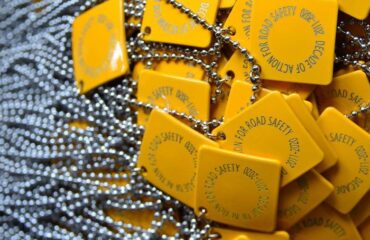Do you have employees who operate motor vehicles for your company?
What steps have you taken to ensure your employees are wide-awake when driving? Do you have a policy? Have you provided education programs?
If you answered the last two questions with “no,” you are putting your employees and your company at risk. This blog post will discuss the importance of sleep, how to avoid drowsy driving and four tips to combat it within your organization.
At some point in our lives, it has happened to many of us—start to feel sleepy or even doze off, to suddenly find yourself heading towards the ditch to your right or the oncoming traffic lane to your left. Thankfully, the great majority of people to whom this happens do not crash. However, many people do, and some of these crashes result in serious injuries, and even death.

While difficult to get an accurate estimate, it is believed that approximately 16.5 percent of fatal crashes involve a drowsy driver. Clearly, a person driving on a sleep deficit is someone looking to be in a crash. Just like alcohol, sleep deprivation impairs our ability to drive safely. Being awake for 18 hours and then driving is similar to driving at a .05 BAC (Blood Alcohol Content). Twenty-four hours without sleep is comparable to trying to drive at a .10 BAC, which is over the per se BAC (Blood Alcohol Concentration) limit for alcohol.
Who Is Most At Risk?
Often the focus of drowsy driving is on commercial drivers not getting enough sleep due to scheduling and traveling long distances, or people who work the night shift or long hours. Of course, someone who uses sedating medications would be at risk, as is someone with a sleep disorder. The bottom line is that any driver who hasn’t gotten enough sleep is at risk of a crash. If you don’t get enough sleep, drowsy driving can happen to you.
It is easy to get into a rush-rush attitude and skimp on sleep. You might start to feel like a push-me-pull-you from Dr. Doolittle’s menagerie and say that you’ll sleep on the weekend or when work slows down, or might even say you’ll sleep “when you’re dead”, a takeoff of a quote from Benjamin Franklin.[1] None of these comments help, and driving with a lack of sleep may hasten your death or someone else’s. Ultimately, our bodies will stage a revolt, quit working, and make us sleep.
One type of sleep that can happen is called micro-sleep. When deprived of sleep, bodies can do micro-sleeps—brief, unintended episodes of sleep that we are not even aware happened. The more the sleep deprivation, the greater the likelihood micro-sleep will occur. When it happens, we don’t respond to external stimuli, such as a traffic light or brakes, even though our eyes may be open. Our bodies need sleep and at some point – enough is ENOUGH; it is time to sleep.

False Cures for Drowsy Driving
So what can you do to counteract drowsy driving? At times you hear people suggest:
- Rolling down the window,
- Turning the radio up loud, or
- Drinking coffee.
None of these suggestions are ultimately effective. With coffee, you might get a short burst of alertness, but if you are sufficiently tired, you can still have micro-sleeps and not respond when required.
Other people think they can tell when they’re about to fall asleep or believe that they don’t need much sleep. Also false—the human body needs sleep and whether you know it or not, it will happen. Most people are not aware how drowsy driving affects their driving abilities, even without falling asleep. Interestingly, in one study a driver who was in a crash denied falling asleep, stating he must have just blacked out. Another driver stated: “I wasn’t drowsy; I just feel asleep.” The need to deny our sleepiness is strong. Growing up, how many times as a child did we get to stay up late, maybe watching TV, and then start to fall asleep? Remember what our parents would say? “Looks like you’re sleepy. Time for bed.” And what was the automatic reaction? “No, I’m not. I’m wide awake,” even though we were sleepy. But this isn’t about watching TV. It is about driving a deadly weapon.
The Danger Signs
There are a number of indicators of driving drowsy – things that if you think about beforehand you’ll recognize, such as:
- Yawning frequently
- Trouble keeping your eyes open
- Memory lapses or daydreaming
- Drifting from one lane to another or onto the rumble strips
- Missing a road sign
When these signs happen, you have to recognize them right away for what they could mean – that you need sleep.

Sleep is a Necessity
The only “cure” to drowsy driving is getting enough sleep. Keep in mind that sleep is a necessity, not a luxury. Adults need 7 to 9 hours of sleep a day and adolescents need 9 to 10 hours.
If you are driving and you notice the indicators, it is time to pull over at the next exit or rest stop and either get some sleep for the night, or at the very least take a nap. If you have an alert passenger with you, let that person drive. And as a general rule, when taking a long trip, be sure to schedule regular breaks every couple of hours to help remain alert.
The best strategy is to plan before starting to drive. Our bodies need sleep to function properly. As adults, we cannot ignore the signs of sleep deprivation. As adults we can no longer automatically respond “Not me. I’m not sleepy. I’m wide awake” when in reality we are tired. It puts all of us at risk. It is time to take “action” and go to sleep.
Companies are Taking Action
Drowsy driving impacts everyone whether at work or at home and businesses are now doing more for their employees. Logistics company, Schneider, implemented a program where its truck drivers are given a sleep apnea screening and if appropriate a treatment program. A study examining the results found that drivers who did not follow the treatment program had a crash risk five times greater than those who adhered to the treatment program. According to Stephen Burks, lead author of the study:
“If we look at 1,000 truck drivers each working for a year, the drivers with obstructive sleep apnea left untreated would have 70 preventable truck crashes, compared to 14 crashes experienced by both a control group and by drivers with sleep apnoea [sic] who adhered to treatment.”
Aetna, Inc. is taking it one step further, recognizing that employees who are rested are more productive and make better decisions. Using fitness trackers to keep track of how much sleep an employee gets, Aetna will pay that employee $25 for each night they sleep at least 7 hours for 20 nights in a row. The company does have a cap of $500 for the year.
According to CEO Mark Bertonlini, he expects his decision to pay for sleep will show positive results in the company’s revenue and improve the bottom line. An independent evaluation of the program found that the company is seeing big gains in worker productivity.
Four Tips for Employers in Combating Drowsy Driving
As an employer what minimum steps should you take?
- Establish an annual safe driving education program. Remember, there is that initial knee jerk reaction – me, I’m not sleepy. Be sure your employees understand the risks. NHTSA (National Highway Traffic Safety Administration) and the National Road Safety Foundation both offer training material you can use.
- Create a policy and put it in writing. Creating a policy can demonstrate your company’s commitment to ending this dangerous issue and guidelines on what your employees should do if it is an issue. Make sure your employees know it will be enforced.
- Monitor your employees’ fitness. Legally, this can be a tricky area to delve into, however, at the very least, by providing education material and supporting efforts to improve themselves, your employees can work towards a healthier lifestyle.
- Demonstrate that eliminating drowsy driving is a priority. Leadership requires a “Do as I say AND Do” attitude. When management takes the matter seriously, and it is taking steps to counteract drowsy driving, then the employees will understand that this is important issue, not only for the company’s bottom line, but also for their own health and wellbeing.
What do you think? What suggestions do you have for employers?
[1] “There will be sleeping enough in the grave.” Benjamin Franklin
Get more articles like this
in your inbox
Subscribe to our mailing list and get the latest information and updates to your email inbox.
Thank you for subscribing.
Something went wrong.






